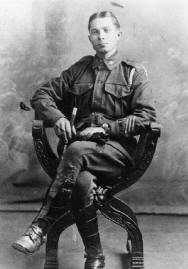Nicolas Korotcoff
| Alias | Nicholas |
|---|---|
| Russian spelling | Николай Феоктистович Коротков |
| Born | 7.07.1890 |
| Place | Samara, Russia |
| Ethnic origin | Russian |
| Religion | Church of England (1915), Russian Orthodox (1942) |
| Father | Feoktist Korotcoff |
| Mother | Uliana Gooliav (Guliaeva?) |
| Family | Wife Rose Korotcoff (née Adams), married 1919, died 1931; Ethel May Korotcoff (née King), married 1932; children Ethel b. 1932, Robert b. 1935, Mary b. 1938 |
| Residence before arrival at Australia | Was in Manchuria for 2 years |
| Arrived at Australia |
from Japan on 10.04.1912 per St Albans disembarked at Cairns |
| Residence before enlistment | Cairns, Port Douglas, Qld |
| Occupation | Labourer, cane cutter, night watchman |
| Naturalisation | 1922 |
| Residence after the war | Port Douglas, Innisfail and district |
| Died | 6.09.1965, Cairns |
Service #1
| Service number | 2063A |
|---|---|
| Enlisted | 13.01.1915 |
| Place of enlistment | Port Douglas, Qld |
| Unit | 9th Battalion, 49th Battalion, 11th FAB, 4th DAC, 111th Howitzer Battery |
| Rank | Private, Driver |
| Place | Gallipoli, 1915; Western Front, 1916-1918 |
| Casualties | WIA 1917 |
| Final fate | RTA 4.12.1918 |
| Discharged | 18.03.1919 |
Service #2 – WWII
| Service number | Q116182 |
|---|---|
| Enlisted | 19.01.1942 |
| Place of enlistment | Cairns |
| Unit | VDC |
| Discharged | 3.02.1944 |
Materials
Digitised naturalisation (NAA)
Digitised WWI service records (cover only) (NAA)
Digitised Embarkation roll entry (AWM)
Korotcoff, Nicholas - Naturalization certificate granted 9 September 1922 (NAA)
Digitised WWII service records including WWI service records (NAA)
Group portrait of the 11th Howitzer Battery of the Australian Field Artillery. E02506 (AWM) (Korotchoff)
Blog articles
Newspaper articles
Finger Severed. - Cairns Post, 11 January 1933, p. 8
From Russian Anzacs in Australian History:
Some underwent their Australian baptism with back-breaking toil on the cane-fields. When Nicholas Korotcoff arrived at Port Douglas in 1912 with his six fellow deserters from the Russian army, they were all recruited by a Mossman cane-farmer, Mr Crawford. According to Nicholas's son, Crawford 'used to call them "these seven Cossacks" and told how they got drunk and the ship sailed without them and that he put them to work on his cane-farm ... . They lived in the little old tin shed there' -- which remained Nicholas's home until war broke out and he rushed to enlist.
[...] Among those who were returned 'on account of Russian nationality' there were several men who had made no application to be discharged, and were not in any case noted for radical inclinations: John Siwezynski, who was decorated with a Belgian Croix de Guerre, Nicholas Korotcoff, Justin Gooliaeff, George Sekachoff (all from artillery units), and Richard Gregorenko from the 14th Field Ambulance. This selection of men, fuelled by the Russian scare, seems rather arbitrary. Nearly all of them were from the 4th Division (its 11th Field Artillery Brigade, where Smagin had earlier served, was completely purged of Russians); other divisional commanders did not bother to purge their ranks of Russians.
[...] Belonging to the Anzac tradition was at the heart of their sense of belonging to Australia. Nicholas Korotcoff 'never missed an Anzac Day Dawn Service, or parade', his daughter said, 'and the night before he'd sit polishing his medals to wear next day. I have those WWI medals now and they still have the original ribbons on them. That was his "Day", and he spent it with his mates, men who'd also served in the war. Peter Harper, Bunty Draney and Cock White were his special friends. ... After a few drinks he'd often sing a few WWI songs. The words had been changed of course, and we learnt them too, but one song was never allowed -- "Mademoiselle From Dickey Bush". We never heard that song right through.'
Gallery

Nicholas Korotcoff
courtesy of Bob Korotcoff
 Russian Anzacs
Russian Anzacs